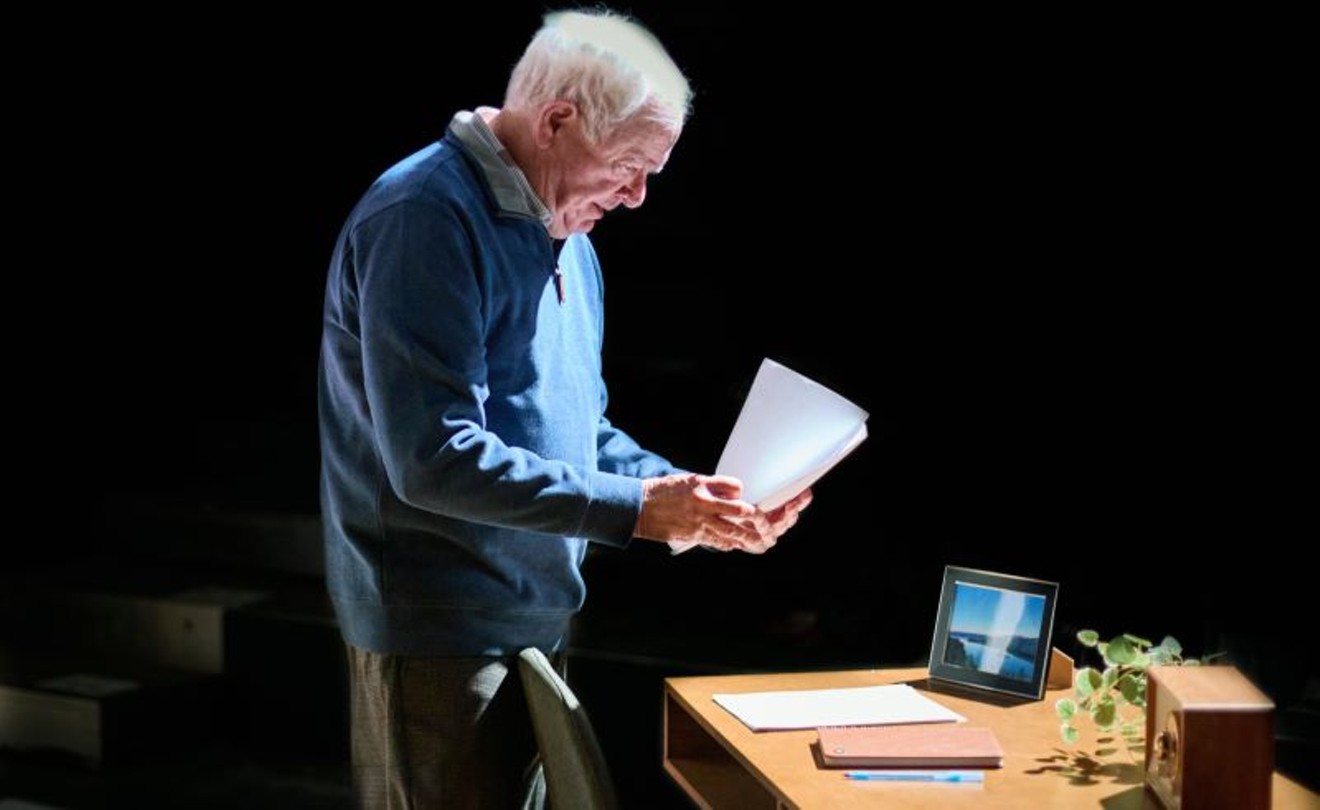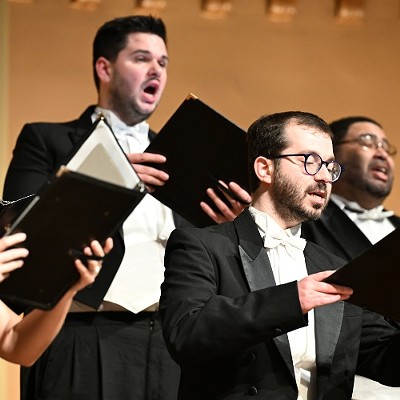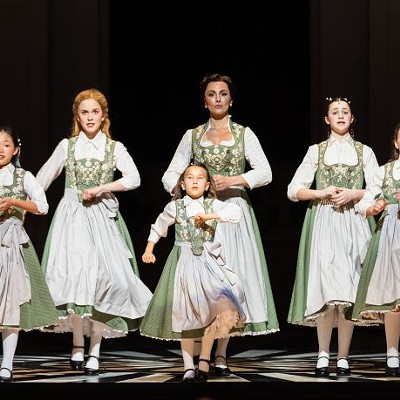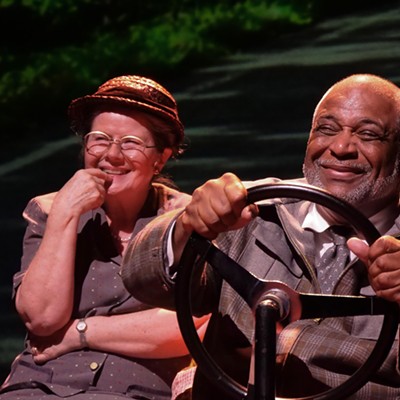Support Us
Houston's independent source of
local news and culture
account
- Welcome,
Insider - Login
- My Account
- My Newsletters
- Contribute
- Contact Us
- Sign out

Kevin Cooney in The Father at 4th Wall.
Photo by Gabriella Nissen
[
{
"name": "Related Stories / Support Us Combo",
"component": "11591218",
"insertPoint": "4",
"requiredCountToDisplay": "4"
},{
"name": "Air - Billboard - Inline Content",
"component": "11591214",
"insertPoint": "2/3",
"requiredCountToDisplay": "7"
},{
"name": "R1 - Beta - Mobile Only",
"component": "12287027",
"insertPoint": "8",
"requiredCountToDisplay": "8"
},{
"name": "Air - MediumRectangle - Inline Content - Mobile Display Size 2",
"component": "11591215",
"insertPoint": "12",
"requiredCountToDisplay": "12"
},{
"name": "Air - MediumRectangle - Inline Content - Mobile Display Size 2",
"component": "11591215",
"insertPoint": "4th",
"startingPoint": "16",
"requiredCountToDisplay": "12"
}
]
André, the titular character in Florian Zeller's elegant exploration into one man's descent into darkness, The Father, is losing his mind.
He doesn't understand what is happening to him and blames his three former caretakers for his missing watch, the rearranged furniture, his favorite daughter who hasn't visited him in months, the general confusion that's driving him mad.
In whose apartment in Paris is he living, his own or his daughter Anne's? Who's that strange man who appears in his living room and tells André that this apartment belongs to him, not André? He says he's Anne's husband, but didn't Anne tell us in the scene before that she's been divorced five years or so? Did André attack his last caregiver with a curtain rod, violently swearing at her? Absolutely not, he attests. I would never do that! He's quite the charming fellow when he wants to be; when the past doesn't collide with the present or the uncertain future. Questions follow questions, not answers.
Zeller's drama, organically translated from the French by Christopher Hampton, is its own mind game. It has won Tonys, Oscars, Molieres, and Oliviers. Uncertainties abound in this 3-D chess, and we don't know what is going on. Zeller plays with us exactly like memory plays with André, batting us around to make us flinch and doubt our sanity. Time – André’s favorite hobby, it seems – bends back upon itself as scenes repeat with different characters saying the same dialogue. But, now, the meaning is entirely obtuse and fragmentary. We can't always believe what we see for it's been tinged and distorted through synapses no longer working, or working just long enough to lash out at the dying of the light.
We are living inside André's fractured head where ghosts swirl with constant surprises and revelations. Things are not getting any better. His days are getting shorter, more muddled, more out of control. Like Lear, he stumbles into the dark, sad and bewildered; unlike Lear, he doesn't recover.
This is an unrelentingly dark play. There is no turning back. Once started, this journey is fitfully lit with confusion piled upon confusion. If you know anyone with advanced Alzheimer's or on the downward
curve, Zeller lays it all out for you – the befuddlement; the anger; the ghastly unknowing; the soothing hug from a loved one, even if you don't quite recognize them; the wonder of everyday pleasures like a chicken dinner; the night terrors; the hellish chill of being left alone, even though you insist, most adamantly, that you're okay, there's nothing wrong.
The overarching mantra is “Don't you remember?” Everyone says this to André repeatedly. He gives them a blank stare or a wicked little smile, throwing his hands in the air in defensive posture. It's not his fault. He's perfectly normal. Even at the end when he achingly cries out for his “Mommy, I want my Mommy,” would he even recognize her if she magically appeared? The heartbreak is palpable. This is the downward tragic spiral that happens to those who have the disease and equally to their loved ones who must also battle through it, watching their beloveds vanish day by day.
The drama has been stylishly directed by Alley Theatre pro Elizabeth Bunch, who gives this play the touch of memory. The actors are all equally blessed, and the play space, designed by master Ryan McGettigan, is set in an impressionistic inky void, where people come and go as quickly as the furniture. The doorways are well-appointed, the cornices have Baroque molding, and the floor is parquet. There is a coup de theatre that involves the doorway into what we believe is the kitchen near the end that stuns us with its surprise. It's a superb reveal that distills everything we need to know.
Veteran Houston actor Kevin Cooney takes on a role which won Anthony Hopkins and Frank Langella their respective Oscar and Tony. He brings a lifetime of acting prowess to Andre, allowing us precious glimpses into his “authoritarian” past and his crumbling present. It's a defining performance; an actor at the top of his craft. His flickers of wicked humor, or scabrous outbursts when tested, or moments of sudden meltdowns are handled with aplomb and consummate skill. We recognize this man. At any moment, he could be us.
Kim Tobin-Lehl, co-founder and resident artist of 4th Wall, has always possessed the openness and vulnerability of the everyman. She makes acting look so simple; she's a pleasure to watch. She catches just the perfect dichotomy of exasperation and deep love as she watches her father disintegrate before her. No matter what Anne does, she's wracked by guilt, and Tobin-Lehl overlays her with immense sympathy and compassion.
Danny Hayes, so memorable in Classical Theatre's School for Scandal from last season, is memorable here as the gruff, overbearing former husband, who bullies Andre for his unwillingness to understand what is happening to him. Julia Krohn, Lien Le, and Orlando Arriaga are such easy actors, one can forget how competent they are. Each of their characterizations are fresh, vibrant, and knowing. Beautiful work all around.
A tip of the hat to lighting designer Clint Allen, who ends each short vignette with a misty blackout that still illuminates; and to sound designer Yezminne Zepeda, whose electronic low thrum mixed with tinkling bells perfectly captures the eerie and ominous mood inside Andre's head as he slowly sinks into the abyss.
There is no happy ending in The Father. Hope runs out, and terrified Andre will disappear entirely. Zeller subtitles his play, “A Tragic Farce.” Tragedy, yes, but farce? There are glimpses of comedy throughout, but this is serious stuff, a world we dread to face. Let Zeller lead the way into this nightmare. We hope and pray that there will be peace for those who survive, and a world without confusion for those who succumb.
The Father continues through May 11 at 7:30 p.m. Thursdays through Saturdays; 3 p.m. Sundays; and 7:30 p.m. Monday, April 6 at Spring Street Studio, 1824 Spring Street, Studio 101. For more information, call 832-767-4991 or visit [email protected]. $25-$60. Monday, May 6, is Pay-What-You-Can.
KEEP THE HOUSTON PRESS FREE...
Since we started the Houston Press, it has been defined as the free, independent voice of Houston, and we'd like to keep it that way. With local media under siege, it's more important than ever for us to rally support behind funding our local journalism. You can help by participating in our "I Support" program, allowing us to keep offering readers access to our incisive coverage of local news, food and culture with no paywalls.
D.L. Groover has contributed to countless reputable publications including the Houston Press since 2003. His theater criticism has earned him a national award from the Association of Alternative Newsmedia (AAN) as well as three statewide Lone Star Press Awards for the same. He's co-author of the irreverent appreciation, Skeletons from the Opera Closet (St. Martin's Press), now in its fourth printing.
Contact:
D. L. Groover
Trending Arts & Culture
- The Hills Are Alive at the Wortham With HGO's The Sound of Music
- The 10 Best And Most Controversial Hustler Magazine Covers Ever (NSFW)
- Top 5 Sickest Stephen King Sex Scenes (NSFW)
-
Sponsored Content From: [%sponsoredBy%]
[%title%]

Don't Miss Out
SIGN UP for the latest
arts & culture
news, free stuff and more!
Become a member to support the independent voice of Houston
and help keep the future of the Houston Press FREE
Use of this website constitutes acceptance of our
terms of use,
our cookies policy, and our
privacy policy
The Houston Press may earn a portion of sales from products & services purchased through links on our site from our
affiliate partners.
©2024
Houston Press, LP. All rights reserved.





